Dragons, Don Draper and a Degree
Alan Taylor’s Vic 8T1 storied path through film and television earns him an honorary degree

PLUS: Indigenous Healing Garden | Vic’s Top Alumni Awards | Support Beyond Scholarships

Alan Taylor’s Vic 8T1 storied path through film and television earns him an honorary degree

PLUS: Indigenous Healing Garden | Vic’s Top Alumni Awards | Support Beyond Scholarships
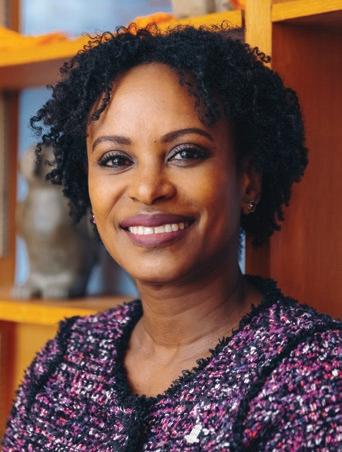
As I reflect on the energy of the recent convocation and alumni reunion season, I am struck by the strong sense of continuity that defines Victoria University. For those of you who graduated recently or decades ago, your presence in our community continues to shape and inspire the experiences of current students. This year, that intergenerational connection felt especially poignant.
During the reunions for both Victoria College and Emmanuel College, I watched students and alumni walk side by side through campus, often pausing together at the site of our new Indigenous Healing Garden. Though still in development, the garden is already becoming what we hoped it would be: a space of reflection, renewal and community. I have seen students study quietly under its trees, faculty and librarians meeting, and alumni rediscover Vic U through its evolving landscape. In many ways, the garden mirrors our institution—rooted in history, growing toward a more inclusive future. If you happen to be in the vicinity of campus, please visit and enjoy the garden.
This spirit of connection—between past and present, tradition and transformation—is at the heart of Victoria University’s identity. Victoria University occupies a unique space alongside and with the University of Toronto. As one of three federated universities, we are both part of a world-class research institution and a distinct academic community. We are home to two vibrant Vic U colleges: Victoria College delivered with the Faculty of Arts & Science, and Emmanuel College, a member of the Toronto School of Theology. This federated structure might not be widely understood outside the U of T context, but those who have studied here know the value of having the best of both worlds: belonging to a smaller, close-knit environment while accessing the breadth and depth of U of T.
Our graduates often say they didn’t just attend U of T—they graduated from Victoria University in the University of Toronto as dual citizens. That nuance matters. It reflects the pride, connection and identity that come with being part of a federated community. And it reminds us that while our students may arrive from many places, they leave with a shared sense of purpose—walking forward, as so many of you did, along a path shaped by Vic U.

Vic Report Summer 2025
Volume LIII No. 1
Published under the authority of the Board of Regents of Victoria University in the University of Toronto.
Publisher: Victoria University
Editor-in-Chief: Leslie Shepherd
Managing Editor: Jennifer Little
Web Editor: Dan Blackwell
Photo Editor: Neil Gaikwad
Design: Randall Van Gerwen
Cover Photo: Neil Gaikwad
Vic Report is sent to all alumni, faculty, associates and friends of Victoria University.
Published regularly each year; circulation 24,000; ISSN 0315-5072. Publications Mail Agreement No. 40741521.
Send milestones and undeliverable Canadian addresses to:
Vic Report, c/o the department of Alumni Affairs & Advancement
73 Queen’s Park Crescent Toronto, ON M5S 1K7
Tel: 416-585-4500
Toll-free: 1-888-262-9775
Email: vic.alumni@utoronto.ca
Website: www.vicu.utoronto.ca
Do we have your correct address? Please send your updated address, phone number and email address to the department of Alumni Affairs & Advancement. Notify us if the graduate named in the address is deceased.
If you would like to write to Vic Report, please email vicu.media@utoronto.ca
Victoria University respects your privacy and does not rent, trade or sell its mailing lists.
Jennifer Ankrett became Victoria University’s new Chief Administrative Officer and Bursar in March. We asked her what brought her back to post-secondary education and what she envisions for the future.
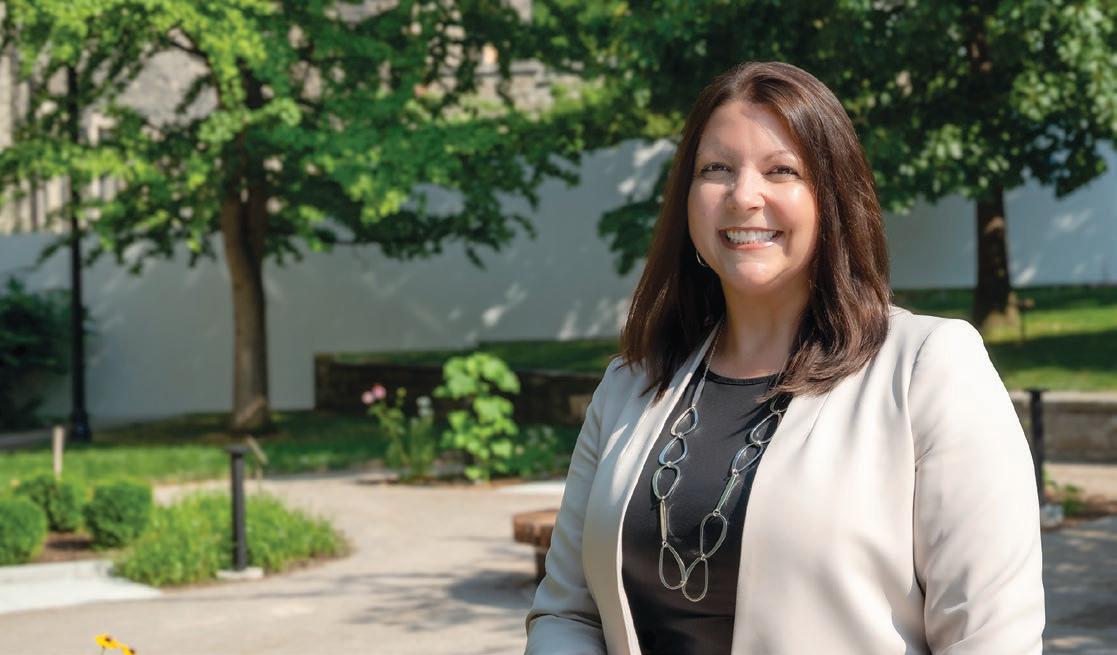
Q. What drew you to Victoria University? What excites you most about stepping into this role?
A. Victoria University is a special community—warm, welcoming and deeply committed. Since joining, I’ve had the privilege of working closely with our dedicated staff, students, faculty, librarians, senior leadership, Board of Regents, president and university partners. While the campus is beautiful (thanks to our incredible maintenance, housekeeping and grounds teams!), it’s the people who make Vic U exceptional.
Alongside my passion for post-secondary education, I was drawn to the opportunity to work with President McEwen, whose leadership blends intellect and heart in inspiring ways. The university’s forward-thinking financial and operational decisions have also positioned us well for the future. I’m excited about the opportunities for innovation, digital transformation, sustainability, major capital projects and service excellence and how I can help champion and advance these priorities.
Q. Collaboration is a key part of university life. How do you plan to work with students, faculty, librarians and staff to support Victoria’s mission and community?
A. Engagement, communication and active listening are essential to building trust and achieving collaborative, mission-aligned outcomes. Being open to feedback and focused on solutions fosters understanding, connection and continuous improvement. The best results come when we incorporate diverse perspectives and stay anchored in our shared values.
Building strong relationships is key to advancing meaningful progress. I prioritize connecting across campus. Early conversations with staff, students, faculty, librarians and the Board of Regents have been among the most energizing parts of my time at Vic U.
Q. Sustainability and innovation are increasingly important for universities. Are there initiatives you’re particularly passionate about?
A. Vic U has an enduring commitment to sustainability, and I’m excited to help advance that work. Key initiatives include the Net Zero 2050 report, which will offer actionable recommendations to help us reach our climate goals. We are also making strides with the integration of sustainable practices into our capital renewal and major capital projects such as ecofriendly materials, repurposing resources, minimizing waste and using technology to optimize construction and building operations.
Innovation is equally vital, not just for infrastructure, but in how we deliver and modernize services, such as leveraging leading practices and AI. My goal is to drive digital transformation, operational efficiency and clientcentricity, grounded in innovation and sustainability.
Q. We hear you’re a proud cat mom! Tell us about your feline companions and what they’ve taught you about leadership?
A. Ah yes, Max and Luna are the adorable beasts who rule our household and our hearts (after our niece and nephews of course)! As someone who generally moves quickly, with intent, Max and Luna are wonderful reminders of balance and humility, as they rarely subscribe to my pace or agenda.
Click here for the full-length version of the story.
By Leslie Shepherd

When the future film and TV director Alan Taylor Vic 8T1 arrived at Victoria University, he was planning a career in academia, like his mother.
He earned a BA in history and philosophy from Vic, followed by an MA in modern European history from Columbia University. He was contemplating where to do his PhD when “suddenly I felt I was in the wrong room, the wrong world.”
Taylor said that while he remained interested in history, he wanted to be more in the public sphere, maybe as a documentary filmmaker. He enrolled in New York University’s Tisch School of
the Arts, where he studied under director Martin Scorsese, fell in love with storytelling and earned an MFA in film studies.
His mother, who had a PhD in art history and was curator of prints and drawings at the National Gallery of Canada, reacted “as though I was running off to join the circus,” he recalled.
Yet Taylor went on to have a successful career as an awardwinning director, writer and producer on TV shows such as Game of Thrones, Mad Men, The West Wing and The Sopranos and films including Thor: The Dark World and Terminator Genisys.
He won an Emmy for outstanding director in 2007 for an episode of The Sopranos and was nominated two more times. He also won a Directors Guild of America award for Outstanding Directorial Achievement in Dramatic Series for the series’ pilot of Mad Men.
On June 12, 2025, he received an honorary degree from the University of Toronto for his outstanding contributions to film and television. He said his only regret was that his late parents were not there to witness the “huge and unexpected honour,” especially his mother, who was his role model.

“I wish I could share this with her,” Taylor said of his mother, who died in 2014. “Look Mom, it turned out OK.”
Taylor said the honorary degree, a Doctor of Laws, honoris causa, was meaningful for him because it blends both his academic roots and his long career in television and movies.
“It’s wonderful to see the two are coming together,” he said. “The work in one world is being acknowledged by the other.”
Taylor said he chose Victoria College because his high school friends in Ottawa were all heading to either Montreal or Toronto. “I fell in love with it,” he said. “It’s an old school in the middle of a big city.”
Taylor said some of his most vivid memories of Vic, besides taking an introductory Shakespeare class from Northrop Frye, were of living in Nelles House where he was residence president for a year.
It was there that he met John Mighton, the mathematician, awardwinning playwright and founder of JUMP Math, which has tutored more than 2 million students. Mighton recently received a Distinguished Alumni Award from Victoria.
Mighton was friends with Taylor’s roommate, who died of cancer after his second year of university. Afterward, “John and I consciously became best friends because of him,” Taylor said. And they remain close friends today.
Taylor also remembers academic “ah-hah” moments, like the time in an introductory philosophy class when he suddenly grasped the essence of Plato’s Republic. “I got tears in my eyes,” he said. “It was so vivid. I mumbled something out and the teacher said, ‘Exactly!’”
He also said that as someone who prefers to work behind the camera rather than in the spotlight, his “vision of heaven” as a student was to be sequestered in the Robarts Library, “in one of the pointy windows that feels like you’re in the prow of a ship, working in solitude with a stack of books and index cards.”
Taylor said his time at Vic also made him appreciate the value of a liberal arts education, which he called the “Swiss Army knife” of academic disciplines.
“It’s not just a first step in a prescribed set of steps to a career, it is the best step toward any career,” he said. “Those of you who have gone that route will be richer for it. If there were more going that route, the world would be a better place and more resilient to some of the forces we see at work against us these days.”
Taylor said it was important that anyone given a public platform, including himself, not remain silent about current events.
“The times we are in ... are out of joint,” he said. “The times are not ordinary and the plans
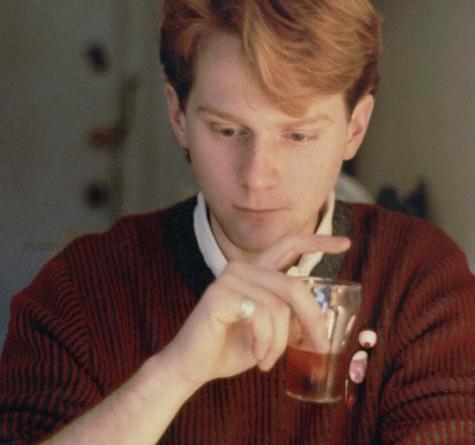
that guided us and we took for granted for a long time seem to be falling apart. The centre is not holding. Academia, journalism and freedom of expression are all under attack.
“Fear is being cultivated and weaponized. Oppression is on the march ... The wealthiest country on the globe, the biggest military, once seen by many as a beacon, the place I called home for quite a while, is now slouching toward craven oligarchy, benighted fascism. Things in a very big way are not going as intended.”
But Taylor said he sees sparks of hope, including the recent elections in Canada, Australia and even in the Vatican. And in the Vic convocation.
His message for the Class of 2025?
Life does not always go as planned. This is to be expected and embraced.
“Have a plan,” he said. “Know why you have it as much as what the plan is. Hold tight to the first. Be ready to blow up the second. As you do you will be forging a path that is entirely your own, unique to yourself, a path that no one has ever taken, that no one else will ever take, the path that does not exist until you forge it.”
Click here for the full-length version of the story.
By Leslie Shepherd

Fifty-seven years ago, Victoria College student David Wilson crossed the stage at Convocation Hall to receive his bachelor of commerce degree.
He returned to the same stage on June 20, 2025, to receive an honorary degree recognizing his volunteer service to the University of Toronto.
In the audience then and now were his wife Shelagh, his sister Ann Wilson Vic 7T0 and her husband Robert Pritchard, the 13th president of U of T.
For Wilson, campaign co-chair of Defy Gravity— The Campaign for Victoria University, the honorary degree was not only a matter of personal pride, but a recognition of his family’s deep roots at U of T— and especially Vic.
“The U of T has played an immensely important role in my family history,” Wilson said at the convocation ceremony. “If it weren’t for the U of T, I wouldn’t be standing here addressing you today. In fact, I wouldn’t be standing anywhere!”
That’s because his parents met at the Victoria University library in 1940. His mother, Margaret, was studying English and counted Northrop Frye among her professors. His father, William, studied commerce and finance. They graduated and married in 1941.
One of Wilson’s strongest memories of Vic is the hours he and his younger brother spent in the library, trying to boost their grades after David convinced Kenneth to pledge to a fraternity.
“My brother’s grades suffered, and I felt responsible,” Wilson said. Every Monday to Thursday, they would have
dinner at the fraternity and then study in the library until 11 p.m. Kenneth got into medical school, became a pediatric plastic surgeon and received the Order of Canada, and “his big brother got over his guilt.”
After earning his bachelor of commerce degree in 1968, David Wilson had a distinguished career in banking and the financial services industry. He was vice-chair of Scotiabank and chair of the Ontario Securities Commission.
His honorary degree recognizes his volunteer work for the University of Toronto, where he served on the Governing Council and the Business Board and was chair of the Presidential Search Committee that selected Meric Gertler as the university’s 16th president. He is currently co-chair of the campaign cabinet for Victoria University, part of U of T’s Defy Gravity campaign.
Wilson also volunteered at the Centre for Addiction and Mental Health for 14 years. He joined the CAMH board in 2011 and chaired it from 2017 to 2020. He now serves on the board of the CAMH Foundation.
David and his sister Ann, a lawyer who spent most of her career with the Ontario government, are also generous donors to Vic.
In 2004, they established The William and Margaret Wilson Bursary for Vic One students in financial need, named after their parents. In 2005, they created the David and Ann Wilson Professorship in Public Policy and Society in the Lester B. Pearson Stream in the Vic One program.
Recently, the siblings pledged to contribute to Vic’s new VOLT (Victoria Opportunity for Leaders for Tomorrow) Scholars program to help Black, Indigenous and racialized students achieve excellence in STEM and other subjects. He said the program appealed to both of them because of the values they learned from both of their parents.
“Our mother was always very interested in immigrants and new Canadians,” he said in an interview. “When she got older, we gave her taxi receipts to come visit us. She would talk to the taxi drivers about why they came to Canada, and then she would tell us about their stories over dinner. VOLT has that element, diverse students, coming to Vic.”
Click here for the full-length version of the story.

By Leslie Shepherd
Congratulations to Vickery Bowles Vic 8T0 and John Mighton Vic 7T8, Hon. 0T6, both recipients of the 2024 Distinguished Alumni Award. Stay tuned for a profile on John Mighton in the next issue of Vic Report.
When Vickery Bowles Vic 8T0 stepped onto the Victoria College campus for the first time in the late 1970s, it was more than just the beginning of her undergraduate journey. It was the continuation of a cherished family tradition.
“My mother had been here in the 1940s,” Bowles reflected. “I remember walking into the Victoria College building and seeing the portraits of former presidents and principals in the entryway. I thought about her walking these same halls during wartime. That really moved me.”
Her mother, Mary Elizabeth “Betty” Cook Vic 4T8, now 98, inspired not only Vickery but also her sister Alison Cook Vic 8T8 to follow in her academic footsteps.
While the family connection to Vic runs deep, the award recognizes Vickery Bowles’s own remarkable achievements. A history graduate who went on to earn a master’s degree in library and information science from the University of
Toronto, Bowles has spent more than four decades advocating for the public good through libraries. She joined the executive team at Toronto Public Library in 1998 and has served as City Librarian since 2015, leading the largest and busiest urban library system in North America.
“This recognition from Vic means the world to me,” she said. “I cherish my time at Victoria College. It’s had such an impact on my life. Being recognized for the work I have done here at the Toronto Public Library and collaborating with libraries across Canada, the U.S. and internationally, means so much coming from my alma mater.”
Bowles’s interest in public libraries took shape during her time as a Vic student.
“Studying history and spending a lot of time in different libraries on campus gave me a real interest in the role of libraries and the work libraries and librarians do,” she said. “It’s where my passion for community service and for information accessibility and intellectual freedom was born.”
Bowles was especially fond of the old Sigmund Samuel Library on King’s College Circle, where

she spent hours under stained glass windows and working at long wooden tables.
Victoria University chancellor emerita, Wendy Cecil C.M. Vic 7T1, who nominated Bowles for the Distinguished Alumni Award, said that Bowles is a global leader in librarianship for her strong stand on freedom of speech and accessibility to all books, particularly those that are endangered or banned.
As City Librarian, Bowles has championed everything from digital equity to deep reading, civic literacy and public engagement on complex issues.
“I feel very strongly about the importance of public libraries in supporting democratic values and freedoms,” she said. “We are seeing more and more challenges to intellectual freedom and freedom of speech and public libraries are standing up for these fundamental principles.”
Cecil praised Bowles for being a leader who attracts and hires good people and then “has the wisdom to let them own what they are responsible for— she gets the best out of people and her staff adore her because she allows them the freedom to do their jobs well.”
By Jennifer Little
Bowles is preparing to retire at the end of August 2025, but she has no set plans beyond taking a well-earned break.
Her Distinguished Alumni Award now sits on her mantle— its presence a daily reminder of her family’s enduring bond with Victoria College. “My mother was our inspiration,” Bowles said.
“She’s just got wonderful memories from those years, this liberal arts education she believes very strongly in,” she said. “It helped her with her critical thinking, understanding of the world, being able to write well, deep thinking. She also remembers seeing Northrop Frye walking around the campus and in the halls of Vic.”
Click here for the full-length version of the story.
Hyacinth Gawne Vic 1T4 and Jean-Paul Bevilacqua Vic 0T9 are winners of the 2024 Victoria College Emerging Leader Award. The award recognizes graduates, 40 years of age or under, who have excelled professionally or who have notable accomplishments in their professional work or volunteer service.
Hyacinth Gawne brings compassion and leadership to her work in Ontario’s public sector and through her commitment to volunteerism. She earned a BA in political science and English and started her career at the Law Society of Ontario. She moved into senior roles in the Ontario Public Service, including the Ontario Treasury Board. She now manages rapid transit program delivery at Metrolinx. Gawne mentors Vic students and serves on the board of governors at Toronto Metropolitan University. “If you’re in a position to help, you have a responsibility to do so,” she said.

Jean-Paul Bevilacqua has built a career rooted in purpose, compassion and commitment to the next generation. He graduated from Vic One’s Northrop Frye Stream and majored in semiotics and drama. He gained attention on MTV’s 1 Girl 5 Gays where he spoke about LGBTQ issues. He worked with LGBT YouthLine, Rainbow Health Network and the Inside Out Film Festival. He was called to the Ontario Bar in 2016 and currently mentors Vic students. He also serves on Victoria University’s Senate Executive Committee. “Any opportunity I have to help and support Vic’s growth is something I’m going to jump at!” he said.
Click here for the full-length version of the story.
By Leslie Shepherd
Shane Joy Vic 2T5 isn’t just a recent graduate of Victoria University in the University of Toronto— he’s a trailblazer, a mentor, a historian and a changemaker.
The first Victoria College student to receive the prestigious McCall MacBain Scholarship—often called Canada’s equivalent to the Rhodes—Joy leaves a legacy of academic excellence and leadership.
As a history major, Joy tackled complex legacies in his senior thesis on Egerton Ryerson, the founder of Victoria College and a reputed architect of the residential school system. His research reflected the depth and nuance that defined his academic journey: thoughtful, courageous and committed to truth.
Joy’s influence extended well beyond the classroom. He was president of the Victoria University Students’ Administrative Council, a residence don, student representative on the Board of Regents and chair of the Student Projects Fund. He was co-director of finance at Caffiends, helped organize Orientation Week twice, and served on the Victoria University Black Excellence and Inclusion Committee.
“Being VUSAC president was the most challenging role,” he said. “You’re managing so many different interests, and you have to make tough decisions while staying grounded in your personal convictions.”
His most fulfilling role? Serving as a don in student residence. “I had hoped to make a difference on VUSAC, but the impact isn’t always visible. As a don, you see it. You see students grow, struggle, succeed—and you’re part of that.”
Why did he choose Victoria University originally?
It started with a quiet campus tour in 2020, during the early days of the pandemic. “In addition to the buildings, Vic has a really beautiful campus and it’s gotten even greater since,” said Joy, who graduated this spring.
It wasn’t just the architecture that drew him in. Joy, a first-generation university student, was motivated by the financial support available at Vic, much of it made possible by alumni donors.
“My parents never went to university; my father didn’t graduate from high school,” Joy said. “Without the scholarship I received from Vic, it would have been immensely difficult, if not impossible, to attend university without significant financial difficulty.”

Another deciding factor was the Vic One program, which offers first-year students small seminar-style classes and close connections with faculty. “That program helped me form lasting relationships and set the tone for the rest of my university experience,” he said.
One of the defining pieces of Joy’s time at Vic was his thesis on Egerton Ryerson. Sparked by the removal of Ryerson’s statue at what was then called Ryerson University and his portrait at Vic U in 2021, Joy wanted to understand the full story. His research took him to the E.J. Pratt Library and the United Church of Canada Archives, where he uncovered Ryerson’s reciprocal engagement with, and early advocacy for, Indigenous communities and his later role in shaping residential schools.
“That contradiction was something I wanted to explore in depth,” Joy said. “Nuance is very important as a historian. He was a complex person.”
Next, Joy will head to McGill’s Max Bell School of Public Policy to explore his interests in Canadian national security, particularly in the Arctic.
As for what makes Vic special? Joy doesn’t hesitate: “There’s a strong spirit of mentorship here. If you try, you will find someone to guide you. And you’ll feel like you belong.”
Click here for the full-length version of the story.
By Samantha Chater

For many students, thriving at university means more than getting good grades. It means knowing who to ask for help, feeling part of campus life and being confident they belong. This fall, Victoria College is helping to support that kind of success with a new program for high-achieving students from under-represented communities, particularly Black and Indigenous students.
VOLT Scholars—short for Victoria’s Opportunity for Leaders of Tomorrow—offers both financial assistance and tailored support to empower students beyond the classroom.
VOLT builds on a foundation of student support available through the Opportunity Awards, a Vic initiative established through a grant from Bader Philanthropies Inc. to help reduce the financial pressure on students from underrepresented groups.
“We saw that even with financial support, some Opportunity Award recipients continued to face barriers,” said Yvette Ali, the Victoria University registrar. “There was clearly more we could do to help students thrive.”
When Dr. Rhonda McEwen became president of Victoria University in 2022, one of her
first priorities was to build on that financial support by also offering academic check-ins, mentorship and dedicated advising. That vision led to the creation of VOLT Scholars, a program designed to bring together funding, proactive advising and a strong sense of community.
Starting this fall, eight secondyear, high-achieving students from under-represented communities, with priority given to Black and Indigenous students, will form the first cohort of VOLT Scholars. Even before the program begins, students chosen as VOLT Scholars are already feeling the impact of that recognition and support.
“For me, being part of the program is extra encouragement on this journey,” said Adura Oyedele, who will join the VOLT Scholars cohort this fall, while completing a double major in health and disease and cell and molecular biology. “Undergrad is a long process, and this motivates me to stay focused. I’d been thinking about a PhD, and this scholarship confirmed that goal and showed me that Victoria College is here to support me.”
The program is led by Imani King Vic 2T3, who joined Victoria College in April 2024 as the first academic adviser, equity and outreach. Some VOLT Scholars begin as Opportunity Award recipients. Others receive the VOLT Scholars Award, an award for VOLT Scholar students who show strong academic promise and leadership.
“The financial support is amazing,” said King. “But that’s just the beginning. What students really need is someone in their corner, someone who’s there to support them, guide them and walk with them through their time at Vic. That’s how I see my role.”
King’s role focuses on proactive advising. She helps students with course selection, accommodation
requests and funding deadlines. Many of the students she works with are the first in their families to attend university. "If high school was hard, university is harder,” said King. “A lot can go wrong. I’m here to help make sure they get connected to the resources they need.”
VOLT Scholars was inspired by the Meyerhoff Scholars Program at the University of Maryland Baltimore County. During a 2024 visit to the campus, King was particularly struck by their six-week Summer Bridge experience— a model of early, structured support that emphasized the value of community and preparation. That visit led her to create Scholars Connect Weekend—a three-day retreat and one of the first VOLT Scholars events held for the first time this June. The retreat helps students prepare for first year, build peer connections and feel more grounded in the Vic community.
“It was very apparent to me that I needed to build transition programming,” said King. “The difference that those three days made on the group was evident.”
VOLT Scholars launches this fall, building on a strong foundation of student support already in place at Victoria College. The program brings together existing initiatives
such as the Opportunity Awards and the Faculty Mentorship Program, which pairs second-year students with faculty for informal academic and career guidance. The result is a more intentional and affirming approach to student support.
“We’re not reinventing the wheel—we’re strengthening what’s already here,” said King. “We want students to know this is a place where they belong, where they’re seen and supported."
VOLT Scholars is made possible through generous donor support, including leadership gifts from David and Ann Wilson and Bader Philanthropies Inc., as well as gifts from the Gordon and Ruth Gooder Charitable Foundation and the Stait Family Fund.
“The majority of the programming costs are covered by donors,” said Ali. “We’d love to grow the program to support more students with additional scholarships. We don’t want to leave anyone behind.”
It's also part of a broader effort at Vic to strengthen advising, build a deeper sense of belonging and help students thrive with timely support. Ali believes the program will help students feel more connected to campus life, improving both academic performance and overall well-being.

Victoria College alumni
David Wilson Vic 6T8 and his sister Ann Wilson Vic 7T0 are among the generous donors supporting the new VOLT Scholars Program. Their gift reflects a family legacy of valuing equity and inclusion— especially their mother’s deep interest in the experiences of newcomers to Canada.
“It’s about helping students feel like they belong and letting them know they're supported,” she said.
She also hopes the program inspires students to dream bigger. “It encourages them to aim higher,” Ali said. “And shows them that Vic is behind them.”
King has already seen how quickly students can build a sense of belonging when given the right opportunity, like the Scholars Connect Weekend.
“They come in strangers and leave as a close-knit group,” she said.



By Samantha Chater
After months of careful restoration and redesign, the Victoria College Chapel has reopened, ushering in a new era for a space that has long stood at the heart of Victoria University.
The chapel, which opened in 1892, has been a cornerstone of campus life, hosting everything from weddings and concerts to lectures and religious services. Now, thanks to a generous $500,000 gift from Brian Johnston Vic 8T1 and his wife Colleen Johnston, the space has been transformed into a modern, multipurpose venue, without losing the spirit that has made it a meaningful place for generations of students and faculty.
“Our goal was to create a versatile space that could be used for events like weddings and dinners, as well as classes, town halls and exhibitions,” said Vikas Mehta, associate CAO of infrastructure and
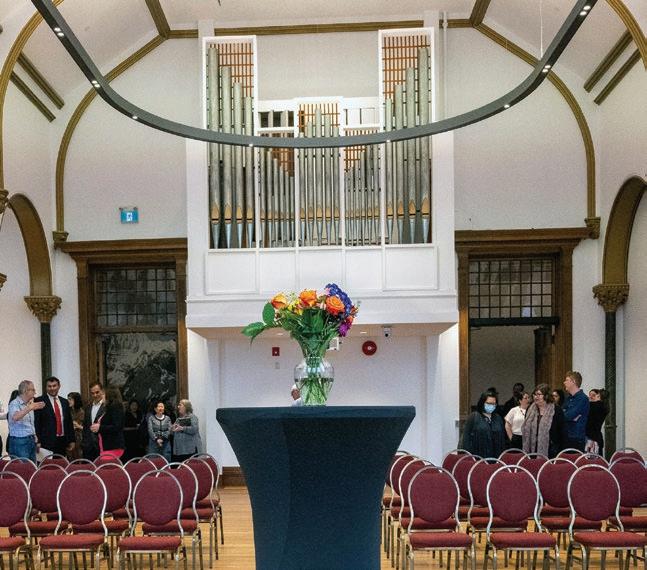
sustainability. “We wanted to retain the chapel’s heritage look and feel while improving functionality.”
The project navigated several challenges, from working within a heritage building to minimizing disruption in a busy academic hub.
The result is a space that blends historic elegance with modern functionality.
“Balancing heritage preservation with modern upgrades was a rewarding challenge,” said Kambiz Jahromi, director of campus operations, who led the project.
“We worked closely with design consultants, city inspectors and trades to deliver a space that respects the past and meets today’s needs.
Fixed pews were removed and replaced with flexible seating that allows the space to adapt to a wide range of events. A new accessibility ramp has been built into the stage and the ceiling has
been redesigned to hide exposed plumbing.
The chapel’s iconic stainedglass windows have been carefully preserved. The original cast-iron columns have been restored and the 1964 organ pipes remain as a decorative feature above the entryway.
Soundproofing was a key focus of the renovation. New panelling, ceiling insulation and upgraded AV equipment make the space acoustically suitable for everything from intimate gatherings to largescale performances. Even the Wi-Fi signal has been improved.
“The lighting is now fully customizable,” Mehta said. “It’s designed to highlight the chapel’s heritage features, like the stainedglass windows.”
Click here for the full-length version of the story.
By Samantha Chater
For generations of Victoria College alumni, the chapel has been more than just a beautiful space— it’s where lifelong memories were made. We invited members of the Vic community to share their wedding day stories and what the chapel meant to them.

“Ours was a small family wedding in August 1972 with just our immediate family, and I remember it being incredibly hot—there was no air conditioning at all in the chapel back then. I was going into my fourth year at Vic and the chapel just felt like the right place. My husband Craig wasn’t a Vic student, but he spent so much time on campus helping with the annual Vic Book Sale, people thought he was a professor! Years later, after Craig passed away in 2015, we held his celebration of life in the chapel and I’ve been back for many book sales since. Each year, when volunteers set up the sale in the chapel, I feel his spirit there. It’s a special place full of memories for our family.”

— Nancy Ruhnke Vic 7T3, member and former chair of the Friends of Victoria University Library
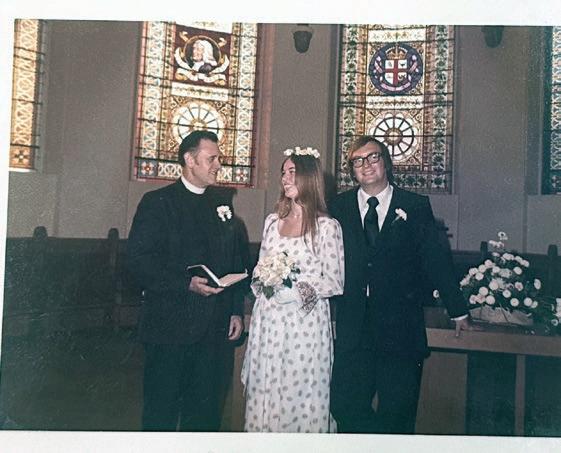
“My husband Helios and I were married at the Vic Chapel on Sept. 1, 1973, on what was, believe it or not, the coolest day of the week at 30 C. At the rehearsal, it was even hotter. Rev. Lutz wore Bermuda shorts and I came in a light summer dress. After the ceremony, while I signed the final paperwork, the wedding party drank all the ice water we’d brought, leaving me with only the cubes! Despite that funny little moment, we’re coming up on our 52nd anniversary. The chapel still holds a special place in our hearts, and we treasure the photo of everyone gathered on the front steps.”
— Marilyn Hernandez Vic 7T1
Christy and I were married in the Vic Chapel on Aug. 22, 1986, a glorious and sunny day, and not coincidentally, my mum Elisabeth’s birthday. Vic campus was a second home and oasis for us. Christy’s father, Prof. John M. Robson, edited The Collected Works of John Stuart Mill in ‘the Mill Room,’ and her mum, Dr. Ann Robson, taught Victorian studies at University College. Christy was an exceptional Vic student. She graduated in 1988 with a 4.0 GPA, won the Lincoln Hutton Essay Prize and many other scholarships. I was EngSci 8T5, far to the south end of campus (I also managed to pass and graduate). The Vic Chapel was the natural place for us to formalize our bond. The stained glass spoke to us both. I remember looking up on our wedding day and seeing the words carved in stone above the archway of the chapel, all caps: ‘THE TRUTH SHALL MAKE YOU FREE.’ They are words to live by—as I have tried to do ever since.”
— James Benson (Ben) Bacque
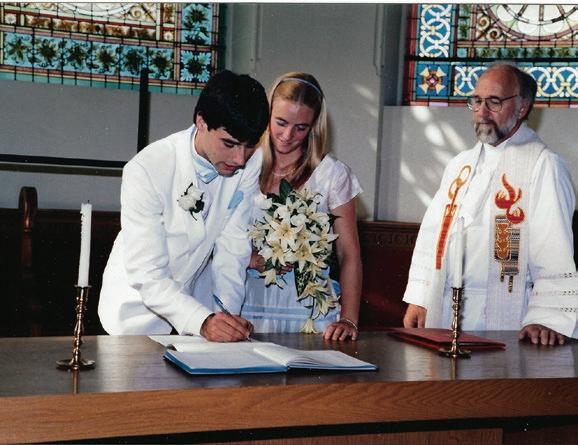
By Samantha Chater
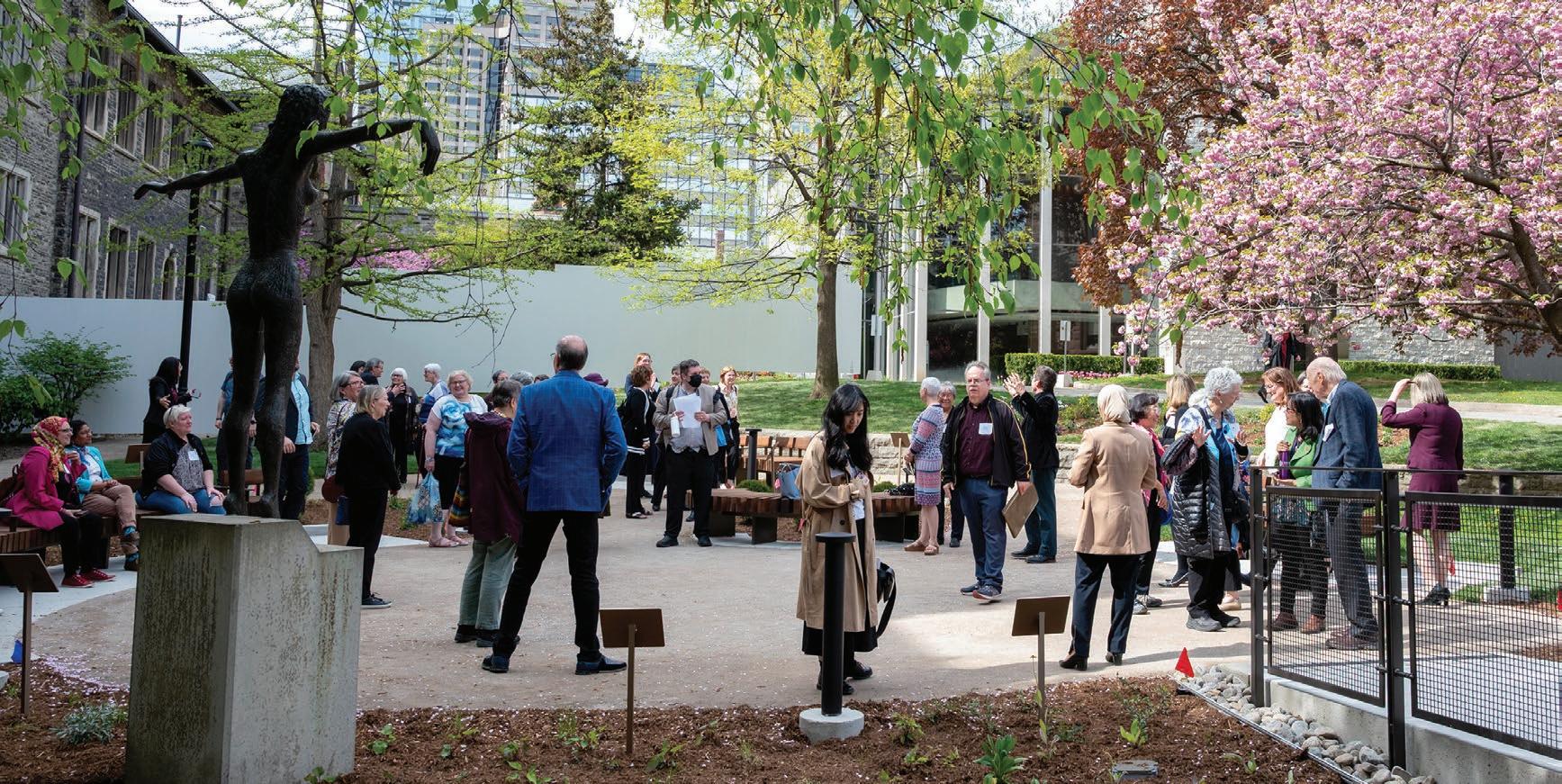
It didn’t take long for the Indigenous Healing Garden at Victoria University to become one of the most important places on campus.
Since the main construction finished in May, the garden on the east side of Emmanuel College has drawn a steady flow of students, staff, faculty, alumni and visitors. Students sit on the benches to read or recharge between classes. Staff pause to take in the garden’s quiet beauty. Alumni visiting for Emmanuel College Alumni Day were quick to notice the change, many stopping to explore the pathways and snap photos.
Finishing touches such as lighting and an automatic door opener for Emmanuel College are still to come. But the garden is already making a strong impression on the community as a space for reflection, learning and connection—a visible expression of Victoria University’s commitment to truth and reconciliation.
“The Indigenous Healing Garden is the perfect place for deep reflection and learning,” said Emmanuel College Principal HyeRan Kim-Cragg. The garden was one of her first priorities after becoming principal in 2022. Created in consultation with Indigenous
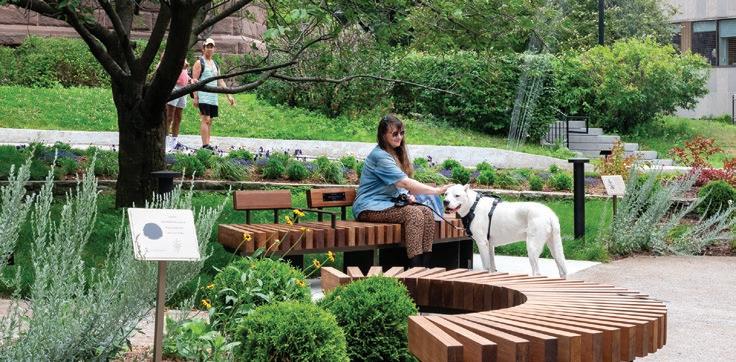
advisers, the project was designed to honour Indigenous relationships with the land.
The garden replaces a grass lawn with a fully accessible space designed for sustainability and inclusion. Gently sloped concrete pathways lead through plantings of sacred Indigenous medicinal plants, native wildflowers and vegetables. Benches throughout the garden invite visitors to linger, rest or gather.
Victoria University President Dr. Rhonda McEwen called it “one of the most meaningful spaces on our campus.”
Speaking at the Emmanuel College Alumni Day, Dr. McEwen reflected on the garden’s deeper significance.
“As we prepare the land for planting, we do so not only in hope of vibrant life taking root, but with the understanding that true healing is both spiritual and communal,” she said. “What truly nourishes this space isn’t just soil or sun, but the stories, prayers, traditions and relationships we bring to it.”
Its prominent location at the heart of campus highlights the presence and importance of Indigenous culture at Victoria University, the University of Toronto and across the city. At the same time, the garden is part of everyday campus life—embraced by students, staff, faculty and visitors alike.
More than a quiet place to reflect, the garden is a space for teaching and collective learning. Emmanuel College plans to integrate it into academic life through outdoor classes and curriculum that engage with Indigenous histories, values and stewardship practices.
“It’s the perfect place for teaching and preaching,” said Kim-Cragg.

As a member of our vibrant alumni community, your milestone deserves to be celebrated! Scan this QR code for a link to our submission form or email your news to vic.alumni@utoronto.ca. Please send us a high-resolution image for our consideration!
Adam John Borovilos Vic 0T5 and his wife Veronika welcomed a son, Kassian Tas Alexander Borovilos on June 12, 2025. Proud relatives include grandparents Anita and John Borovilos Vic 7T0, aunt Alexa Borovilos Vic 0T4 and siblings Maksym and Kami.
parts. The publishers describe it as a “hilarious, sexy, rom-com about a debut author and her new publicist who find themselves crossing the professional line when sparks fly on her book tour.”
and teachers for their services to universities, education and science.
Raymond Cox Vic 7T6 has been awarded the status of professor emeritus of finance at Thompson Rivers University in Kamloops, B.C. He studied biology at Vic and then earned a CPA, MBA (University of Windsor) and PhD (Michigan State University). Some of his research interests include corporate finance, bank failures, bankruptcy and business cycles.

Angie (Eggert) Littlefield Vic 6T9 published Walking with Oma: A Memoir (Now or Never, 2025). Littlefield follows the 600-kilometre walk her Jewish grandmother took in 1945 from the Theresienstadt Concentration Camp in what was then Czechoslovakia to Hamburg, Germany. The memoir tackles issues of identity, complicity and intergenerational trauma.

Emily Ohanjanians Vic 0T4 secured a two-book deal with Ballantine Books at Random House Canada. Ohanjanian, a former editor at Harlequin, will publish her debut novel, The Book Tour, in two

Jennifer O’Kell Vic 0T6 published her first, full-length novel, The Maker of Spells. She is a fantasy writer and self-described enthusiast of ethical quandaries of psychological depth, spells, dragons and love triangles. The novel centres around a spellwright and diplomat who is drawn into a web of political intrigue and romantic complications in a world where magic and diplomacy intertwine.
Alexandra Palmer Vic 7T9 published Christian Dior visionnaire: 1947–1957 (Martinière BL, 2024) a French edition of her Dior: A New Look, a New Enterprise 1947–57 (Victoria and Albert Museum, 2009, 2019). The archivist at the house of Dior Paris, Soizic Pfaff, called the book her “bible,” Palmer noted. She is a former senior curator of global fashion and textiles at the Royal Ontario Museum and chair of its Veronika Gervers Fellowship. Palmer is a Chevalier in the Ordre des Palmes académiques, a French national order awarded to distinguished academics


Jesse Sherrett Vic 0T3 is now a partner of the legal firm Sterlington PLLC in New York City. Sherrett is an international arbitration lawyer who has represented clients over the last decade in large commercial disputes heard before international arbitration tribunals.
From Lindsay Zier-Vogel Vic 0T5 comes an insightful and heart-rending exploration of motherhood, grief and the search for identity in The Fun Times Brigade (Book*hug Press, 2025). The novel examines the enduring challenges of reconciling being an artist with being a mother.

Want to read the e-edition of Vic Report and support our sustainability efforts?
Send us your email and we will stop sending you the paper copy! Please write vic.alumni@utoronto.ca or call 416 585-4500.

This year, we celebrated our largest graduating class in history— 769 students crossed the stage at Convocation Hall. With so many grads, the June 12 Faculty of Arts and Science convocation was held in two ceremonies, each marked by its own joyful procession through Queen’s Park and a pair of lively receptions. Twice the celebration, one unforgettable milestone.
Your gift to the Annual Fund helps Victoria University students discover their passions and make a meaningful impact in the world. The fund supports scholarships and bursaries, maintains our beautiful campus and fuels innovative programs like Scholars-inResidence and Vic Ready. Click here to donate today.


